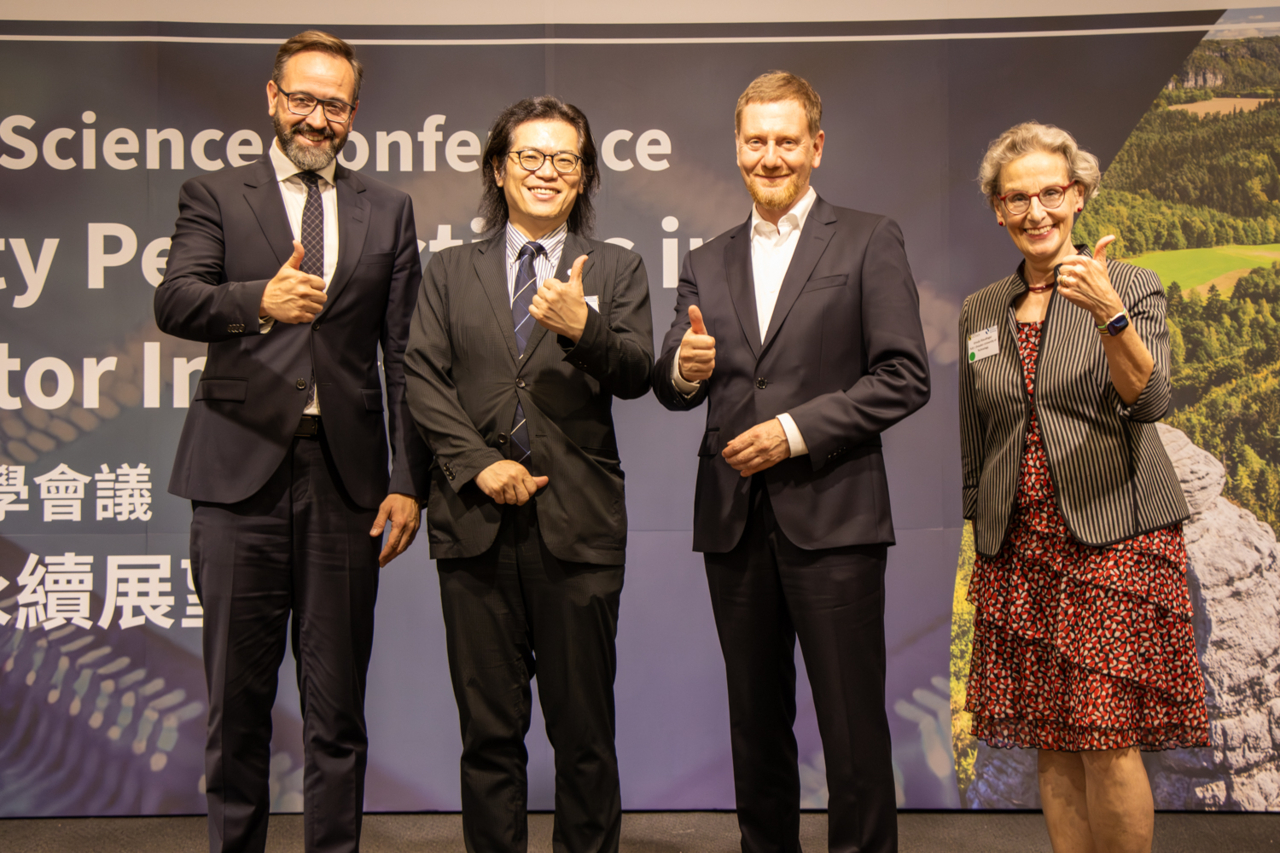
Saxon Minister of Science, Sebastian Gemkow, stated: "Over the past two years, the academic and scientific relationship between Taiwan and the Free State of Saxony has seen an unprecedented and unimaginable development. We are grateful for the trust that Taiwan's largest enterprise has placed in Saxony as a high-tech hub. We also look forward to leveraging this opportunity to promote economic cooperation in the fields of education and science."
Taiwan-Germany Semiconductor Cooperation Upgraded: New MoU is Signed with National Institutes of Applied Research (NIAR)
To deepen the cooperation between Taiwan and Germany in key technology sectors, the Saxon Science Liaison Office Taiwan announced today that several talent exchange programs led by the Saxon State Ministry of Science, Culture and Tourism (SMWK) will undergo a major expansion. At the science conference on September 30, TUD Dresden University of Technology signed a Memorandum of Understanding (MoU) with Taiwan's National Institutes of Applied Research (NIAR), further solidifying the partnership in the semiconductor field.
Prof. Ursula M. Staudinger, Rector of TUD Dresden University of Technology, commented: “By hosting the Saxony-Taiwan Science Conference and signing a Memorandum of Understanding with the renowned National Institutes of Applied Research, we are deepening our cooperation with our Asian partners in the technology sector, which is crucial for global value creation. Our already close cooperation with TSMC in study, research, and transfer here on site and in Dresden underlines the importance of scientific cooperation, particularly in semiconductor research, for our strategic development.”
This MoU marks the twelfth cooperation agreement signed between Universities from Saxony and Taiwanese academic institutions within two years, symbolizing the fruitful results of bilateral exchanges.
Program Success: STIPT Expands with Strong Participant Endorsement
Since its launch in September 2023 through a joint agreement between the Saxon Ministry of Science (SMWK), TUD Dresden University of Technology, and TSMC, the Semiconductor Talent Incubation Program Taiwan (STIPT) has successfully sponsored 85 students from Saxony to study in Taiwan. Participants completed a six-month program at top institutions including National Taiwan University, National Taiwan University of Science and Technology, and National Yang Ming Chiao Tung University, followed by an internship at TSMC's Taichung site, realizing a complete journey from academia to industry. This summer, three members from the first STIPT cohort returned to Taiwan to attend a semiconductor Academy of Innovative Semiconductor and Sustainable Manufacturing (AISSM) summer school at National Cheng Kung University (NCKU), demonstrating the program's profound impact.
In this regard, Dr. Josef Goldberger emphasized that the return of STIPT alumni is not only an affirmation of the program's success but also inspires us to explore further cooperation. Consequently by 2026, the program is expected to expand, with Taiwanese universities like NCKU and NTHU identified as potential additional key strategic partners.
Fruitful Results: From Student Exchange to Cutting-Edge Joint Research
Beyond student cultivation, bilateral scientific cooperation has also yielded rich results. Under the framework of a joint German-Taiwanese research grant program, the National Science and Technology Council (NSTC) and the German Research Foundation (DFG) have co-financed a three-year collaborative project between a team from Prof. Johannes Heitmann of TU Freiberg, the Fraunhofer IPMS, and Professor Tian-Li Wu of International college of semiconductor Technology, National Yang Ming Chiao Tung University (NYCU), focusing on the pioneering technology of "Ferroelectric FinFETs."
Furthermore, collaborations have extended into interdisciplinary research. The National Yang Ming Chiao Tung University (NYCU) and the Leibniz Institute of Ecological Urban and Regional Development (IOER) have recently initiated a one-year bilateral project titled “Silicon Urbanism.” Funded by the German Research Foundation (DFG) and the National Science and Technology Council (NSTC), the comparative urban research links Silicon Saxony (Dresden-Saxony) and Silicon Taiwan (Hsinchu-Taiwan) through situated learning and knowledge co-creation.
Diverse Channels Thrive as SSMP Reopens for Applications in October
Other exchange programs have also achieved remarkable success. Since its launch in September 2024, the Saxon Student Mobility Program (SSMP) has facilitated academic exchanges for 55 students from Taiwan to Saxony and 54 students from Saxony to Taiwan. The program is scheduled to reopen for applications this 1st October, offering short- and long-term study opportunities to undergraduate, graduate, and doctoral students across all academic fields. Additionally, the Saxon international internship Program (SiiP) has already facilitated internships for 17 students, providing them with valuable cross-border work experience.
To promote higher-level research collaboration, the Saxon Science Ambassador Program (SSAP) has been launched concurrently, providing funding for academic staff from Saxony planning research stays in Taiwan and completing the comprehensive exchange network from students and interns to researchers.
Event Impressions












